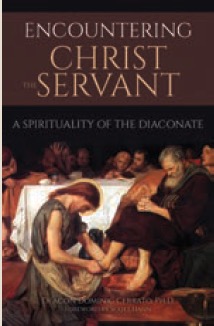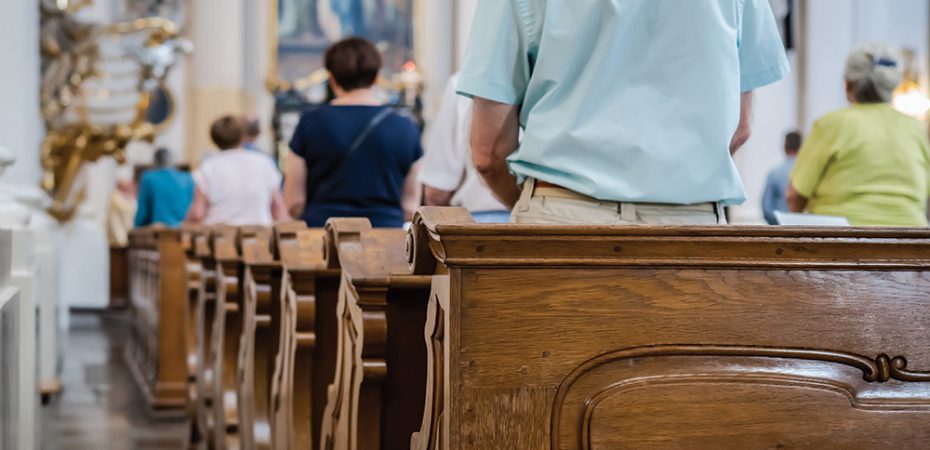The Interior Life as a Place of Encounter
By discovering God from within, one discovers himself in a profound way
Deacon Dominic Cerrato Comments Off on The Interior Life as a Place of Encounter
The following is an excerpt from “Encountering Christ the Servant: A Spirituality of the Diaconate” (OSV, $18.95) by Deacon Dominic Cerrato.
What more do you want, O soul! And what else do you search for outside, when within yourself you possess your riches, delights, satisfactions, fullness, and kingdom — your Beloved whom you desire and seek? Be joyful and gladdened in your interior recollection with Him, for you have Him so close to you. Desire Him there, adore Him there. — Saint John of the Cross, Spiritual Canticle
Ours is not so much an outward search for God but a desire to discover Him from within. The God who created us, who loved us into being, who died for us while we were still sinners, is already present in our interior lives, waiting patiently to be encountered and reencountered. While He is certainly present in the world around us — in the people we meet, in the situations we confront — that outward presence goes largely unnoticed and unappreciated without an inward recognition. Our ability to see Christ in those we serve begins with an interior life attuned to His Divine Presence.
It’s only in the interior life that the deacon comes to know and love Christ the Servant, to whom he was configured on the day of his ordination. As expressed succinctly in the first lesson of the Baltimore Catechism, knowing and loving God are absolute preconditions for serving Him. This is because we simply can’t love whom we don’t know. But knowing God isn’t merely understanding Him — to the extent possible — on an intellectual level through the study of faith, though this is essential. Without exposure to and immersion in such sources as the Scriptures, Tradition, and the Magisterium, we couldn’t speak the name of Christ, much less know Him. However, to truly know Him is to move in, through, and beyond this study (which is a lifetime endeavor) to a deep, interpersonal relationship, sharing in His very life. This is only possible through the cultivation of an interior life.
Relationships, if they are healthy, are always mutual in that they admit of a kind of reciprocity that ought to grow in intimacy and tenderness over time. In deepening our relationship with God through perfection in the spiritual life, we come, ever so slowly at first, to see ourselves as God sees us, albeit in a limited way. This wondrous self-revelation enables us to begin to appreciate our real self-worth. We are, as Jesus demonstrated so beautifully on the Cross, worth dying for. Entering into this truth helps us to see that everything we have, every event we experience, whether triumph or tragedy, is a gift from God.
…………………………………………………………………………………………………………………………………………………………………………….
READ MORE
 “Encountering Christ the Servant” (OSV, $18.95), by Deacon Dominic Cerrato, explores the unique contribution and spirituality of the diaconate. The book draws heavily on the Catholic spiritual tradition and applies it to the diaconate with the goal of intimate communion with Christ the Servant. The book focuses on the interior life as the source of the deacon’s diaconate; that from which he draws his strength and ministry. Topics include the interior life as the place of encounter, the distinctiveness of diaconal spirituality, the importance of empathy, and the various struggles associated with growth in the spiritual life. From here, Deacon Cerrato moves into the need for abandonment, the awareness of the ever-present God, his hidden operations, and the sacrament of the present moment.
“Encountering Christ the Servant” (OSV, $18.95), by Deacon Dominic Cerrato, explores the unique contribution and spirituality of the diaconate. The book draws heavily on the Catholic spiritual tradition and applies it to the diaconate with the goal of intimate communion with Christ the Servant. The book focuses on the interior life as the source of the deacon’s diaconate; that from which he draws his strength and ministry. Topics include the interior life as the place of encounter, the distinctiveness of diaconal spirituality, the importance of empathy, and the various struggles associated with growth in the spiritual life. From here, Deacon Cerrato moves into the need for abandonment, the awareness of the ever-present God, his hidden operations, and the sacrament of the present moment.
Finally, Deacon Cerrato offers deacons some practical suggestions of how they can grow in intimacy with Christ the Servant through a daily prayer of consecration drawn from the diaconal prayer of ordination and an evening examine.
The book is a summons best expressed in the invitation, “Deacons, become what you are.”
…………………………………………………………………………………………………………………………………………………………………………….
When we prayerfully reflect on these gifts, when we meditate upon their implications, we discover in and through them the Giver — we encounter none other than God Himself. These gifts are, in many respects, sacramental. They enable us, in a certain sense, to transcend the material world, move into the spiritual, and there abide in His saving presence. Here, as we bask in the light of His love, we’re overwhelmed by the encounter and experience a profound sense of gratitude. “Lord, I am not worthy to have you enter under my roof ” (Mt 8:8). It’s precisely this gratitude, born of our participation in divine love, that is the inspiration of and motivation for diaconal ministry. Thus, the source of the deacon’s diaconate, that which enables him to effectively incarnate Christ the Servant, is nothing other than intimate communion with Him. The interior life represents the place of inward encounter with Christ, without which a deacon is blind to the many exterior encounters with Christ that come his way each day. This inward encounter is what transforms the deacon’s work from social work to ecclesial ministry, from a good thing to a saving reality.
In its broadest sense, the interior life is that inner place where we’re alone with ourselves. It’s the place of thought, imagination, deliberation, and choice. It’s where we dream, pray, reflect, and meditate. It’s where we discover God, ourselves, and others. It’s the inner space where truth is grasped, goodness is acquired, beauty is appreciated, and love is born.
It’s possible, with some reflection, to distinguish between the various dimensions of the interior life. There’s the speculative, capable of intellectual thought; the moral, capable of choosing good or evil; and the spiritual, capable of intimacy with God and others. These are, of course, interrelated; in a certain sense, they interpenetrate one another, finding their nexus in our one person. Although they can be distinguished by their operations, they can’t be separated without somehow obscuring the whole person.
While the interior life admits of all these dimensions, when we speak of it, we tend to speak of the spiritual dimension. Because of this, terms such as “interiority,” “the inner life,” and “the spiritual life” are often used synonymously in the Church’s Tradition. We will follow this usage, with all of these terms referring to that inner place where we encounter Christ and seek intimate communion with Him.
The interior life is nonphysical and thus finds its exercises within the powers of the soul. To be human is to be a body/soul composite, and while the soul expresses the interior life, the body expresses the exterior life. These two aspects of our human nature are to be integrated. This integrity requires that for the interior life to be authentically lived, it must be expressed in the exterior life. This is nothing less than a corollary of faith and works. Accordingly, Saint James writes:
“What good is it, my brothers, if someone says he has faith but does not have works? Can that faith save him? If a brother or sister has nothing to wear and has no food for the day, and one of you says to them, ‘Go in peace, keep warm, and eat well,’ but you do not give them the necessities of the body, what good is it? So also faith of itself, if it does not have works, is dead. … For just as a body without a spirit is dead, so also faith without works is dead” (Jas 2:14-17, 26).
Faith is an act of the interior life. For it to be realized and lived, it must be expressed in concrete acts consistent with what is professed. To do otherwise is to undermine its authenticity, calling into question whether that faith is truly held by the one professing it. Thus, if someone were to profess to be a faithful Catholic while at the same time being unfaithful to his wife, his profession of faith would be significantly undercut by his actions. Indeed, those actions that are inconsistent with the Faith would call into question whether he truly believes what he says he believes. He may deceive others, and even himself, but this inconsistency reveals his infidelity rather than his fidelity. Beyond this, if he freely and willingly engages in what he knows to be grave sin, he breaks communion with God and His Church. This is hardly the act of a faithful Catholic.
In many respects, the relationship between the interior and exterior life is sacramental. Properly understood, a sacramental, like the sacraments themselves, is a visible sign of invisible realities. The sign points to and makes present that which is hidden. Just as the body is the sacrament of the soul, the exterior life is a sacrament of the interior life. Without the body, the soul remains unknown, trapped in the realm of the spirit. It’s precisely in and through the body that the soul enters the world and makes itself known and, equally importantly, comes to be known. Together, and only together, do body and soul express the whole person. In a similar manner, without the exterior life, the interior remains unknown. It’s strictly in and through the exterior life that the interior life is revealed. Together, and only together, do they express the whole person.
To share such things as faith and spirituality, hopes and aspirations — indeed, to share our very selves in love — the interior life must transcend itself. This takes place only through the exterior life, expressed in concrete acts. Likewise, receiving another’s faith and spirituality, hopes and aspirations — indeed, receiving their very selves in love — occurs first through our exterior life. Our interior life is only accessed through the exterior life. This intrinsic relationship means that while we can explore the spirituality of the diaconate, we do so with the understanding that, as with faith and works, the interior life without the exterior life is dead.
DEACON DOMINIC CERRATO, Ph.D., is editor of The Deacon and director of diaconal formation for the Diocese of Joliet, Illinois. He is the founder of Diaconal Ministries, where he gives national presentations and retreats to deacons and diaconal candidates. Follow him on Facebook to continue the conversation.





